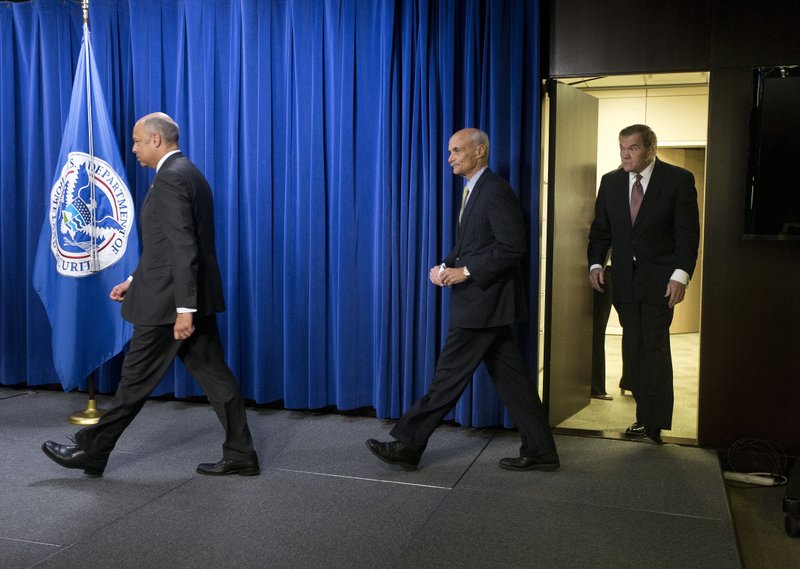WASHINGTON -- The Senate voted Wednesday to advance a bill to finance the U.S. Department of Homeland Security, a step toward sending the funding dispute to House Speaker John Boehner to resolve.
The Senate procedural vote was 98-2, with Senate Republicans Jeff Sessions of Alabama and Jim Inhofe of Oklahoma voting not to move it forward for Senate consideration. Majority Leader Mitch McConnell said he would work to get the funding measure to the House by the end of the week.
Funding for the agency expires after Friday. House Republicans have refused to consider a spending bill unless the measure also blocks President Barack Obama's orders on immigration. The Senate plans to address the two issues in separate bills.
"I welcome bipartisan cooperation to pass the DHS funding bill" and a separate immigration measure, McConnell of Kentucky said in an emailed statement.
Senate Minority Leader Harry Reid said: "All eyes now shift to the House of Representatives. It's no secret. The Republicans in the House don't know what they're going to do."
Boehner, R-Ohio, has refused to endorse McConnell's plan to separate the issues. On Wednesday, he declined to say whether he would put it to a vote in the House.
House Appropriations Chairman Hal Rogers, R-Ky., said he would support a bill that solely funds the homeland security agency, though it "remains to be seen" how such a measure would fare in the chamber.
Boehner told party members during a private meeting earlier Wednesday that he and McConnell, a fellow Republican, hadn't spoken in two weeks, several lawmakers said.
"Our staff talk back and forth," Boehner said when asked about contact between the leaders. "Sen. McConnell's got a big job to do; so do I."
Meanwhile, Reid, D-Nev., said he and McConnell "have had a number of very good discussions in the last 24 hours or so."
The risk of a partial Homeland Security Department shutdown comes less than two months after Republicans took control of both chambers of Congress. McConnell has insisted there will be "no government shutdowns."
Some lawmakers said they particularly hope to avoid any partial homeland agency shutdown lasting until Tuesday, when Israeli Prime Minister Benjamin Netanyahu is set to address a joint meeting of Congress on security issues.
"That would be ironic," said Rep. Raul Grijalva, D-Ariz., co-chairman of the House Progressive Caucus.
Rep. Steve King, R-Iowa, said Wednesday that such a shutdown wouldn't necessarily pose a security risk.
"A vast majority of DHS services -- essential services -- will not be shut down," he said. "So, it does not mean we are at risk."
Officials have said that more than 85 percent of the agency's workforce -- 200,000 out of 230,000 employees -- would continue to work even if the funding were not approved because they are deemed essential for the protection of human life and property. That includes front-line workers at the Customs and Border Patrol, the Secret Service and the Transportation Security Administration.
Republicans have been trying to use the agency funding bill to block Obama's decision in November to ease deportation for about 5 million illegal aliens in the U.S. The Senate failed four times to advance a House bill that linked the issues.
Democrats oppose any legislation to block Obama's immigration orders. Even if such a measure gets to the president's desk, Obama has said he would veto it.
But as the Senate moves forward, harder-line House Republicans are digging in and saying they won't vote for any bill stripped of the immigration language. Some, including Rep. Marlin Stutzman of Indiana, said Boehner could face a backlash from conservatives in his conference if such a bill goes to a vote, because it likely would be passed with Democratic support.
Boehner has been under pressure from the Tea Party wing of the Republican Party to use the homeland security bill as leverage after the speaker promised a battle over immigration in 2015 to his rank and file.
Boehner told fellow Republicans late last year that "we were going to fight it tooth and nail," Stutzman said. "And I've applauded his efforts so far."
Rep. Austin Scott of Georgia, president of the initial Tea Party class of House Republican freshmen elected in 2010, said he doesn't agree with those who say Republicans must avoid a partial shutdown of the Homeland Security Department.
"First of all, anybody who is deemed essential for national security is still going to be on the job," said Scott.
McConnell and Boehner have been in a tug of war over strategy. Two weeks ago, McConnell declared the homeland security bill "clearly stuck in the Senate" and said the next step was up to the House. Boehner, though, insisted that "the House did its job" and the Senate must make the next move.
He repeated that Wednesday.
"I'm waiting for the Senate to act. The House has done their job," he said at a news conference where he repeatedly sidestepped questions about his plans.
While Boehner wouldn't say how the House would respond to a Senate bill that funds homeland security without addressing immigration, other leaders suggested possible paths forward.
House Rules Committee Chairman Pete Sessions, R-Texas, said one option is to pass a short-term funding measure, followed by a conference committee to resolve differences between bills passed by the House and Senate. He said Republican leaders won't necessarily adopt his preferred approach.
Several House Republicans -- John Fleming of Louisiana, Matt Salmon of Arizona and Mo Brooks of Alabama -- said they definitely will oppose any bill that funds homeland security without addressing Obama's immigration actions.
Salmon said Boehner would find himself on "very thin ice" if he relied primarily on Democratic votes to pass such a bill.
Thirty House conservatives sent a letter to Boehner and other top Republican leaders Wednesday urging them to "stand firm against these unlawful executive actions" by Obama.
The developments in Congress unfolded as Obama met at the White House with immigration activists before departing for a speech in Florida, where more than 23 percent of the population is of Hispanic descent.
One person attending the meeting, Frank Sharry quoted Obama as saying Republicans were engaging in theater to appease conservatives who oppose his directives on immigration.
Obama also predicted that his administration would win a reversal in court of a ruling that has temporarily blocked his policies from taking effect, said Sharry, the executive director of activist group America's Voice.
In Florida, Obama was attending a town-hall meeting in Miami hosted by the Spanish-language channel Telemundo. He was expected to defend his immigration actions, which he has said are necessary to encourage a large population to come out of the shadows, work and pay taxes.
One of the president's top priorities, White House spokesman Josh Earnest said Wednesday, is "reforming our broken immigration system."
Information for this article was contributed by Heidi Przybyla, Billy House, Kathleen Miller, Erik Wasson, Derek Wallbank and Kathleen Hunter of Bloomberg News; by David Espo, Erica Werner, Jennifer Kerr, Andrew Taylor, Charles Babington, Alan Fram and Steven Ohlemacher of The Associated Press; and by Christi Parsons and Lisa Mascaro of Tribune News Service.

